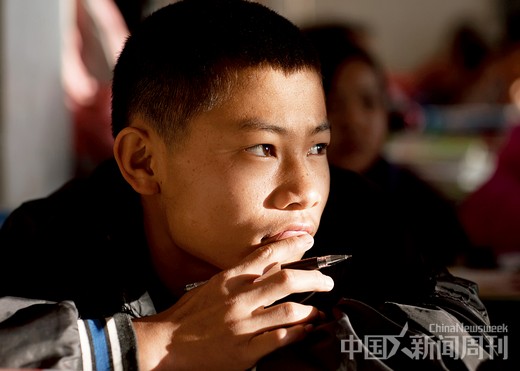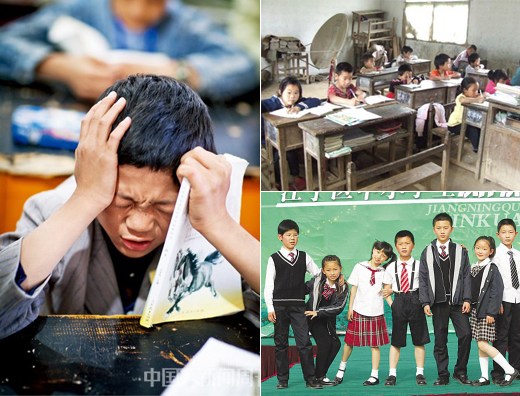
Living in remote and impoverished villages all year long, the students are like frogs at the bottom of a well who are only able to see a little patch of sky above.

Adequate funding and good teachers in poor schools play an important role in helping disadvantaged students overcome their socio-economic background and perform with their affluent peers.
(Ecns.cn)--Premier Wen Jiabao pointed out in the 2012 Government Work Report last week that government spending on education will increase to 4 percent of GDP this year. The announcement drew attention to the huge gap between China's rural and urban education levels from scholars, who have been calling on authorities to ensure the proper allocation of funding for education, especially in rural and poor areas.
Since the 1990s, the proportion of rural students in China's universities has been dropping steadily. The percentage at Peking University has fallen from 30 percent to 10 percent, while at Tsinghua, rural students make up only 17 percent of the student body in spite of accounting for 62 percent of entrance exam takers, reported the Chongqing Evening News, citing research by the two schools last year.
A survey carried out in Beijing, Shanghai and Guangdong Province by Peking University in 2009 revealed that only 0.7 percent of the 2,732 rural respondents had university degrees or higher, as opposed to 13.6 percent among the 3,253 urbanites polled.
Pablo Zoido, an analyst with the Program for International Student Assessment (PISA), has conducted studies specifically on how disadvantaged students can overcome their socio-economic background and perform with their affluent peers. He found out that adequate funding and good teachers in poor schools play an important role in crossing the barriers.
The Report on Implementation of National Education Funding in 2010 by the Ministry of Education showed that budgetary spending on each primary school student in Beijing hit 5,837 yuan, nearly 10 times higher than that of each pupil in Guizhou Province, which was a mere 579 yuan.
Yuan Guilin, a professor at the Center for Rural Education and Economic Development of Beijing Normal University, added that in some impoverished areas in Liaoning Province, the classrooms were so cold in winter that some schools had to close at 2:00 p.m. before the sun sets.
Though fiscal allocations for education in poor regions have been largely increased, the rural-urban gap remains large, pointed out China Newsweek.
"We are driving tractors on dirt roads, while they (urbanites) are driving cars on highways. How is it possible for us to catch up with them?" Gao Qingyu, schoolmaster of a middle school in Lincang, Yunnan Province, told the magazine.
Poor education facilities have also driven away many good teachers, most of them poached by bigger schools in towns or cities.
Wang Pengwei and Si Xiaohong, professors at Shaanxi Normal University, conducted a survey among over 360,000 teachers of primary and middle schools in the province in 2009, and found that only 42.19 percent of teachers in rural areas held a bachelor's degree, while the proportion for urban teachers was 73.81.
Consequently, under-qualified teachers working on shoestring budgets results in a sharp decline in quality of teaching.
"The teaching is boring and students are not roused," said Xiang Min, a teacher at a primary school in Chongqing, adding that most "left-behind" children—whose parents are migrant workers in cities—are too shy and self-abased to open their mouths to speak in class.
"In this regard, rural kids would never perform on par with their urban peers," Xiang commented.
Furthermore, living in remote and impoverished villages all year long, the students are like frogs at the bottom of a well who are only able to see a little patch of sky above.
If you ask rural students to write a composition themed on Harry Potter, many of them would be baffled completely, since they have never heard of him, said China Newsweek.
The 13-year-old boy Shi Pingfu in Chahe Village, Yunnan Province, told the magazine that his favorite TV program is the Weather Report and that his pets are the four pigs he is raising.
Shi lives with his grandparents in a shabby 10-square-meter house and has never been to other places. Even though he is in junior high, Shi still cannot write much.
"I want to keep studying after graduation, but that's not likely to happen," he said, explaining that the chances of him getting admitted to college are very slim.
Besides, reports of "ant tribes" (university graduates suffering low-paid jobs and cramped housing on the outskirts of cities) and "snail houses" (small, makeshift dwellings) have long shattered Shi's belief that knowledge changes one's fate.
"If college education cannot change my fate, why would I do it? In that case, I don't need to go to senior high. Actually, I don't even need to finish junior high," Shi said.
Statistics from Mengtong Middle School in Mali Township, Yunnan, showed that 216 students registered in 2006, but the number dropped to 77 two years later. About 65 of the dropouts, who were weary of studying, stayed at home doing nothing.
The quitters are badly educated and have poor farming skills, and, if not guided properly, could become threats to social stability, analyzed China Newsweek.
At this, Li Chunling, a researcher at the Chinese Academy of Social Sciences, pointed out that vocational schools are lacking, and that the examination-oriented education system has discouraged many rural kids who are unable to enjoy high-quality education.

Copyright ©1999-2011 Chinanews.com. All rights reserved.
Reproduction in whole or in part without permission is prohibited.